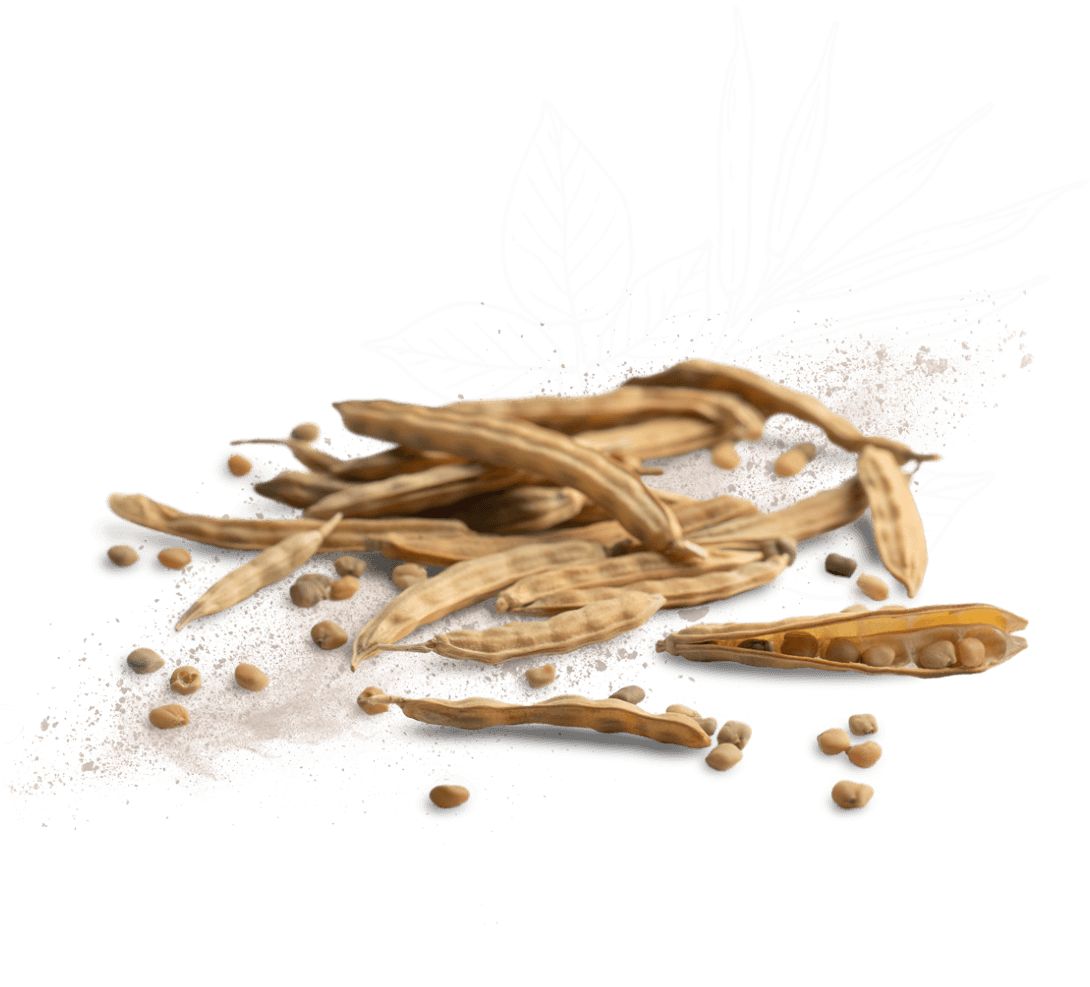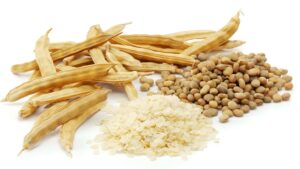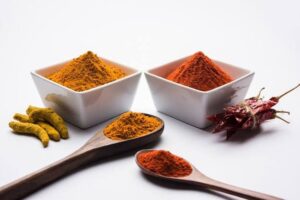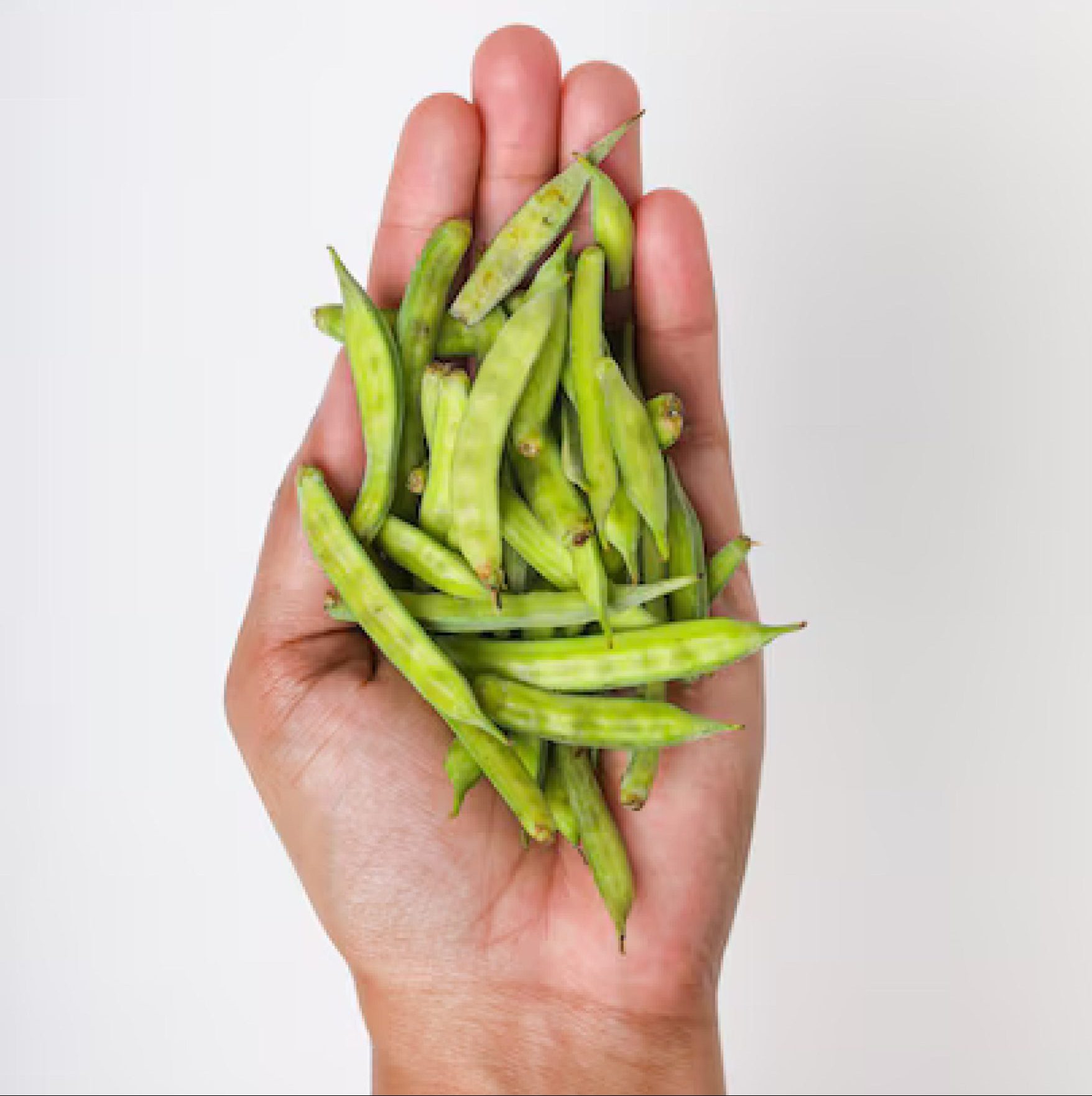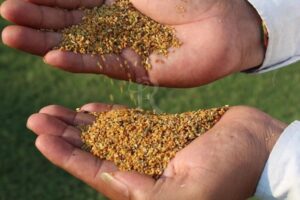Why Roasted Guar Korma is preferred as Fish Meal Replacer?

Why Roasted Guar Korma is preferred as Fish Meal Replacer? Roasted guar korma is increasingly being recognized as a viable alternative to fish meal in animal feed due to its nutritional profile and economic advantages. Here’s how it can replace fish meal effectively: High Albumin + Oil Content (O+A): 62-64% PROFAT: Roasted guar korma has a high protein content (56-58%) and Oil (4-6%), making it a great substitute for fish meal, which is valued for its protein. The protein in guar korma is easily digestible when processed properly, supporting animal growth and health. Rich Amino Acid Profile: Guar korma contains essential amino acids like lysine and methionine, which are important for livestock, cattle and aquaculture diets. While fish meal is a superior source of certain amino acids, guar korma can be supplemented with additional amino acids to meet specific nutritional requirements. Cost-Effectiveness: Fish meal is often expensive due to limited supply and high demand. Roasted guar korma is a more economical option. Its availability as a byproduct of guar gum production ensures a steady supply Eco-Friendly Alternative: Using roasted guar korma reduces reliance on fish meal, which is linked to overfishing and environmental concerns. It supports sustainable agricultural practices by utilizing a byproduct that might otherwise go to waste. Improved Palatability and Nutrient Absorption: The roasting process reduces anti-nutritional factors like trypsin inhibitors and saponins in guar korma, enhancing its digestibility and palatability for animals. Energy and Fiber: In addition to protein, roasted guar korma provides energy and Fiber, which are beneficial in animal diets, especially for poultry and cattle. Application in Specific Feeds: Poultry Feed: Replacing fish meal partially or entirely in poultry diets without compromising growth or egg production. Aquaculture: In fish and shrimp farming, guar korma is being studied and used as a partial substitute, often combined with other ingredients to balance amino acids. Livestock Feed: Cattle and dairy animals benefit from its protein and energy content. Key Considerations: Ensure proper processing to remove anti-nutritional factors. Balance diets with other protein sources to meet specific nutritional needs. Conduct trials to determine the optimal inclusion rate for specific species or animals. By addressing these factors, roasted guar korma can serve as a sustainable and cost-effective alternative to fish meal. Why Rama Gum is Your superior supplier. Rama Gum Industries stands out as the preferred choice for Roasted Guar Korma as a fish meal replacer due to its superior quality, high protein content, and excellent digestibility. Their Roasted Guar Korma is processed using advanced techniques that enhance its nutritional profile, making it a sustainable and cost-effective alternative to traditional fish meal. With a commitment to quality control and consistency, Rama Gum ensures that their product is free from anti-nutritional factors, improving feed efficiency and overall fish health. Additionally, their expertise and industry reputation make them a trusted partner for aquaculture nutrition solutions. Conclusion. Roasted Guar Korma proves to be a promising and sustainable substitute for fish meal in animal feed, offering numerous benefits. Its high protein content, rich in essential amino acids, makes it an excellent alternative for promoting growth and development in livestock and aquaculture. Moreover, it is an environmentally friendly option, as it helps reduce the reliance on fish meal, which often contributes to overfishing and environmental degradation. The use of roasted guar korma not only enhances the nutritional quality of animal feed but also supports the development of more sustainable agricultural practices. Its positive impact on both the economy and the ecosystem highlights its potential as a valuable resource in the feed industry.
Fenugreek Gum – Natural Feed Additive for Stronger, Healthier Animals
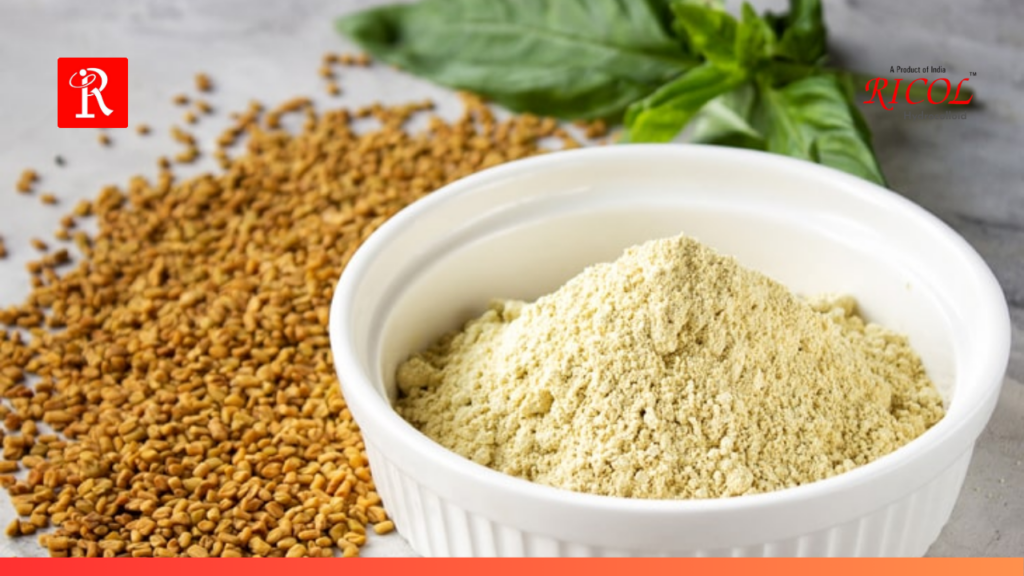
Fenugreek Gum – Natural Feed Additive for Stronger, Healthier Animals by Rama Gum Industries India Ltd. Why Animals Need Special Feeds Products? Animals too need healthy foods like human beings as they are vulnerable to many diseases like human beings. Especially domestic animals need special feeds products than those animals that live in forests. The major factor behind feeding animals with special food products is when the animals are raised for human utilizations. This is due to the fact that if we consume flesh of healthy animals, we can experience safe health; on the other hand, eating the flesh of diseased animals might result in developing several harmful factors also. The animals that are grown for consumption purpose and security purpose requires routine and regular care and attention in terms of feeding healthy animal feeds and keeping them in hygienic condition. In addition, animals also entail higher level of resistance like human beings to stay safe from getting epidemic infections such as flu, mad cow, skin diseases, and other infections. Considering the necessity of hygienic factors in food products for the five sensed living things, many countries have imposed strict rules over maintain quality standards in adding appropriate animal feeds ingredients such as gum powders while producing different types of food products for suiting different animal feeds Functional Properties of Fenugreek Gum Fenugreek gum is valued for its ability to: Thicken and stabilize: Enhances the texture of food products such as sauces, soups, and dairy items. Emulsify: Helps blend oil and water-based ingredients, making it useful in salad dressings and beverages. Form gels: When mixed with water, it develops a gel-like consistency, ideal for bakery and confectionery applications. Improve texture: Adds a smooth and creamy consistency to processed foods. Enhance shelf life: Its stabilizing properties help extend the freshness and quality of food products over time. Act as a natural prebiotic: Promotes the growth of beneficial gut bacteria, improving overall digestive health. Improve water retention: Helps retain moisture in baked and processed foods, preventing dryness and enhancing product quality. Why Use Fenugreek Gum in the Animal Feed Industry? Enhances Digestion High Fiber Content: Rich in soluble fibre, aiding digestion and preventing constipation in animals. Prebiotic Properties: Supports the growth of beneficial gut bacteria, improving nutrient absorption. Boosts Appetite and Feed Palatability Natural Flavour Enhancer: The slightly sweet and pleasant aroma makes feed more appealing to animals. Increases Feed Intake: Particularly beneficial for weak or recovering animals that have lost their appetite. Supports Growth and Weight Gain Improves Nutrient Utilization: Enhances nutrient absorption, ensuring animals get the maximum benefit from their feed. Natural Alternative to Growth Promoters: Aids in healthy growth without the need for artificial additives. Strengthens Immunity Rich in Antioxidants: Helps protect animals from infections and diseases. Reduces Inflammation: Speeds up recovery from illnesses and injuries. Increases Milk Production in Dairy Animals Natural Galactagogue: Stimulates milk production in cows, goats, and buffaloes. Improves Milk Quality: Enhances the fat content and overall nutritional value of milk. Environmentally Friendly and Sustainable Natural and Biodegradable: Unlike synthetic feed additives, fenugreek gum is eco-friendly. Chemical-Free Solution: Reduces reliance on artificial growth enhancers and antibiotics. Common Applications in the Feed Industry: Livestock (Cattle, Sheep, and Goats): Supports digestion, growth, and milk production. Poultry (Chickens and Ducks): Enhances gut health and promotes weight gain. Horses: Provides energy and supports gut health. Fenugreek is a nutrient-rich herb with several health benefits. Here are some key nutritional advantages: Regulates Blood Sugar – Helps improve insulin sensitivity and lower blood sugar levels, beneficial for diabetics. Supports Digestion – Aids in reducing bloating, constipation, and acid reflux. Boosts Heart Health – Helps lower cholesterol and triglyceride levels, reducing heart disease risk. Promotes Weight Loss – Rich in fibre, which enhances satiety and reduces appetite. Improves Lactation – Increases milk production in breastfeeding mothers. Enhances Testosterone Levels – May boost testosterone and improve libido in men. Anti-Inflammatory Properties – Contains antioxidants that reduce inflammation and oxidative stress. Aids in Skin & Hair Health – Helps treat acne, dandruff, and promotes hair growth. Boosts Immunity – Rich in vitamins and minerals that strengthen the immune system. Supports Kidney and Liver Health – Helps detoxify and protect these vital organs. Why Rama Gum is Your superior supplier. Rama Gum Industries is a trusted and leading manufacturer of high-quality fenugreek gum, known for its purity, consistency, and superior nutritional value. With state-of-the-art processing facilities, strict quality control measures, and a commitment to sustainability, Rama Gum ensures that every batch retains the natural goodness and health benefits of fenugreek. Their expertise in producing chemical-free, finely milled, and highly soluble fenugreek gum makes them the preferred choice for the food, pharmaceutical, and animal feed industries. Conclusion: Fenugreek gum is a highly beneficial, natural feed additive that enhances animal health, digestion, and overall productivity. Rich in fibre, protein, and essential nutrients, it supports gut health, boosts immunity, and improves feed efficiency. Its natural appetite-enhancing properties make it ideal for promoting weight gain and increasing milk production in dairy animals. As a sustainable and chemical-free alternative to synthetic additives, fenugreek gum not only improves livestock well-being but also aligns with the growing demand for eco-friendly and antibiotic-free farming practices. Its multiple benefits make it a valuable addition to the animal feed industry, ensuring healthier animals and higher farm productivity.
How Antibiotics In Animal Feed Can harm the Children, Why to choose Organic ?
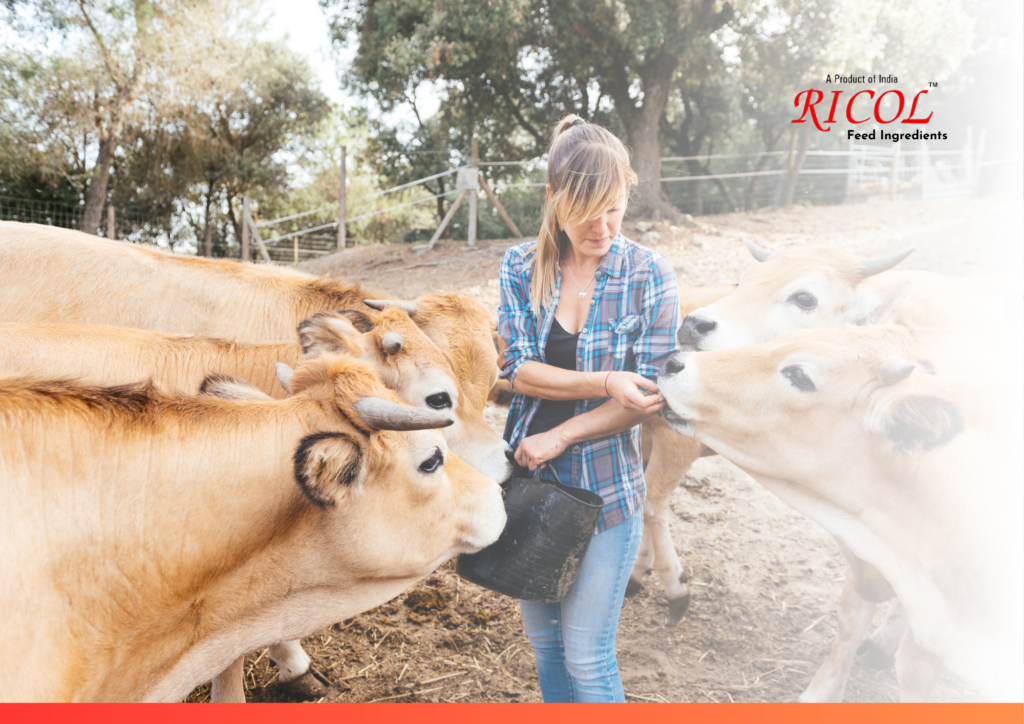
How Antibiotics In Animal Feed Can harm the Children, Why to choose Organic Guar Korma? What Are Antibiotics? Antibiotics are compounds with antimicrobial activity that helps in treating and preventing diseases. They also serve the purpose of constituting growth and development to the livestock. Antibiotic substances like procaine penicillin, oxytetracycline, tylosin etc. are introduced in animal feed to make the livestock healthier. These chemical substances can fatten animals, causing the livestock to gain weight so that more kilograms of meat can be sold to the market. Antibiotics also help in limiting the spread of infection or diseases among animals. However, the overuse of antibiotics in animal feed is making it difficult for doctors to treat life-threatening infections in children. How antibiotics in animal feed is harmful to children The report from the American Academy of Pediatrics (AAP) points out that the boundless act of offering antimicrobials to healthy domesticated animals to advance development and disease resistance among them is making the medications ineffective when they are in need to treat diseases in people, especially the children. Children under 5 are prone to risk, particularly kids with low immunity and who have undergone bone marrow transfers, or organ transfers. Children in the clinic for injury and other serious issues can be more in danger, as well. In the year 2013, an American report showing a total of 19056 infected cases, 4200 hospitalizations, and 80 deaths were presented to the Foodborne Diseases Active Surveillance Network, a CDC surveillance system (a system that analyses and interprets health conditions), covering 15% of the US population. Non-typhoidal Salmonella species of bacteria is a significant cause of foodborne illness in children. This species can cause neonatal and pediatric infections through indirect exposure to contaminated food. Children may acquire salmonella infection through direct contact with the cattle. Campylobacter is another species of bacteria that causes foodborne illness in children. They can cause health effects that arise due to eating poultry or non-poultry meat products and unpasteurized dairy products. Exposure to sewage water and farm animals infected with this bacteria may cause infections in infants and children. Methicillin-resistant Staphylococcus aureus bacterium (MRSA) is another kind that causes infections in various parts of our body. These species can transmit from animals to human beings through close contact. Antibiotic resistance is becoming a major problem among kids as well as adults. The use of antibiotic drugs to feed healthy animals for prolonged periods can create new health dangers to humans. Food processing workers may add antibiotic agents in the feed of cattle or other food-delivering animals just to treat and control irresistible illnesses and not for development or growth. The antibiotics fed to the cattle lead to the growth of antibiotic-resistant bacteria in the animal. These microorganisms can then be spread to human beings when we consume animal food. Adequate cooking of animal meat might destroy antibiotic-resistant bacteria. However, there are still chances for transferring these microorganisms into your body. These organisms can also enter into a human body through direct contact with an animal carrying the organism. People working in farms, processing facilities etc. are more prone to these bacteria than the general population. So, while choosing the feed for your cattle, it is best suggested to pick organic feed or food raised without antibiotics Why use of Organic Guar korma as feed is increased? Organic Roasted Guar Meal (Roasted Guar Korma) is obtained from an Organically grow source and an ideal source of protein for animal feeds that contain essential amino acids as well as high energy. It is an alternative source for animals to other expensive sources like groundnut, soya, etc. This guar meal contains more percentage of the germ part of guar seeds. The roasted guar meal is been processed with the help of heat and steam enhances the protein as well as amino acid digestibility increasing the productivity of livestock and poultry. It is a 100% natural product that does not contain additional chemicals and is also rich in carbohydrates. For animal feed, Guar meal can also be used in conjunction with other feedstuffs that gives a complete nutritional feed without any harm. Advantages of Organic Roasted Guar Korma Higher percentage of Crude Protein (CP)( Above 56% O&A) Higher Digestibility Percent(85-90%), due to the removal of anti-nutritive factors More desirable and balanced Amino acid Profile 100% Natural Source and Organically grown It is a Non-GMO product Higher Energy content and fat percentage Lower percentage of less digestible Fiber Higher Palatability, complete elimination of characteristic bean odor and taste Why Rama Gum Industries (India) Ltd. Is leading the Organic feed supply? Rama Gums is a leading manufacturers and supplier of Guar Gum powder, Guar Gum Splits, and Guar Meal in Gujarat, India. We here at Rama Industries give great importance to Quality. Processing and Packaging of the final product is done in such a way that it preserves the highly delicate product in good condition for a long time. Rama Industries and its flagship brand Ricol command a high reputation worldwide for quality products, efficient services, and level of reliability as a stable supplier of quality products. The company lays special emphasis on maintaining quality standards parallel to the highest in the industry. It is always busy developing new and improved products for various applications. We Believe in “Binding Relations through Ingredients” An ECOCERT, FSSC-22000, BRC, an ISO22000, HACCP, GMP+, FAMI-QS, KOSHAR, FSSAI, HALAL & ORGANIC CERTIFIED COMPANY.
Cassia Gum for Food, Pet food – Low anthraquinone content
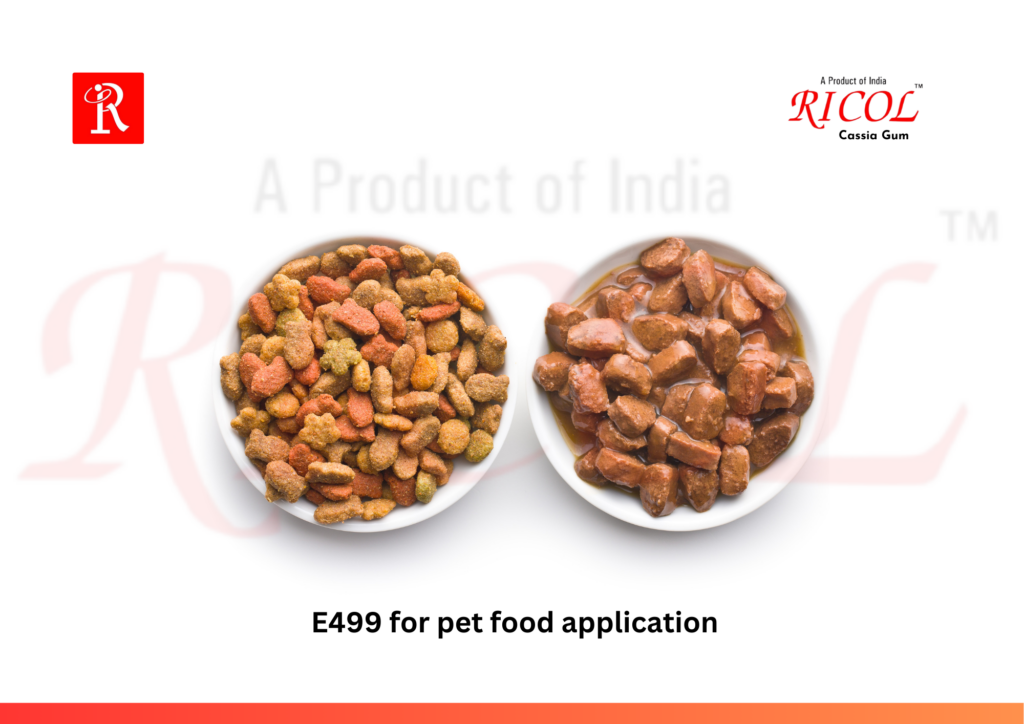
Cassia Gum in Food, Pet Food & Technical Industry Cassia gum, a natural gum derived from the seeds of the Cassia plant, has gained significant attention in the food and industrial sectors due to its versatile properties. This eco-friendly and cost-effective ingredient is widely used for its binding, thickening, and stabilizing qualities. In this blog, we will explore the various uses and benefits of Cassia gum and its growing significance in various industries. What is Cassia Gum? Cassia gum, also known as Cassia tora gum, is derived from the seeds of the Cassia tora plant, a leguminous shrub found in tropical regions, particularly in India. The gum is obtained by grinding the seeds of the plant, producing a powdery substance with a variety of useful properties. It has a neutral taste and is highly soluble in water, making it ideal for a range of applications. Benefits of Cassia Gum Natural and Eco-friendlyCassia gum is a natural, biodegradable product, making it an environmentally friendly alternative to synthetic gums and stabilizers. Its production process has minimal environmental impact, promoting sustainable practices in industries that utilize it. Versatile Thickening AgentOne of the primary reasons Cassia gum is so highly sought after is its exceptional ability to thicken and stabilize products. It is used extensively in the food and beverage industry, where it serves as a thickening agent in soups, sauces, dairy products, and confectionery. Improves TextureCassia gum enhances the texture of many products, adding smoothness and consistency. In bakery goods, it helps improve dough elasticity, leading to better texture and volume. In dairy products, it contributes to a creamier consistency. Affordable and Cost-effectiveCompared to other natural gums, Cassia gum is relatively low-cost, making it an economically viable solution for manufacturers looking to reduce production costs while still maintaining quality and functionality in their products. Health BenefitsBeyond its functional uses in food production, Cassia gum also has potential health benefits. It is known to support digestive health and may act as a mild laxative, helping in the treatment of constipation. Its antioxidant properties can also contribute to overall health. Uses of Cassia Gum Food IndustryCassia gum is most commonly used in the food industry as a thickener and stabilizer. It is used in the production of sauces, dressings, ice cream, dairy products, and bakery goods. Its ability to retain moisture and improve texture makes it an ideal ingredient for processed foods. Cosmetics and Personal CareDue to its emollient and moisturizing properties, Cassia gum is also found in a variety of cosmetic products. It is used in lotions, shampoos, conditioners, and face creams to enhance the product’s consistency and improve skin hydration. Pharmaceutical IndustryIn the pharmaceutical industry, Cassia gum serves as a binder and stabilizer in the formulation of tablets and capsules. It helps in the uniform distribution of active ingredients and ensures the stability of the product. Textile IndustryCassia gum is used as a finishing agent in the textile industry. It enhances the feel and texture of fabrics, providing a smooth finish without compromising the fabric’s integrity. Oil and Gas IndustryDue to its high viscosity and ability to retain moisture, Cassia gum is used in drilling fluids for the oil and gas industry. It helps to improve the flow properties of the fluids, ensuring better efficiency during drilling operations. How to Use Cassia Gum Using Cassia gum in various products is straightforward, but the quantity required will depend on the specific application. Typically, it is used in concentrations ranging from 0.5% to 2% of the total formulation, though this can vary. It is highly soluble in water and should be mixed carefully to avoid clumping. Conclusion Cassia gum is an incredible natural resource with numerous benefits and applications across various industries. Whether you are involved in food production, cosmetics, pharmaceuticals, or textiles, Cassia gum offers a sustainable, cost-effective solution that enhances the quality and functionality of your products. As demand for natural and eco-friendly alternatives continues to grow, Cassia gum is poised to play a significant role in the future of manufacturing and production. By incorporating Cassia gum into your products, you can take advantage of its remarkable properties while contributing to more sustainable practices. If you’re interested in learning more about Cassia gum or incorporating it into your business, feel free to reach out to suppliers who specialize in this versatile ingredient.
Free of ethylene-oxide – ETO Free Guar Gum Statement

What is Ethylene oxide (EtO) and Why to use EtO Free Guar gum powder ? Guar gum powder is a popular ingredient commonly used in Food, Healthcare etc. Guar gum powder is referred due to its excellent thickening, stabilizing, film forming & emulsifying properties, Rama Gum Industries is recognized for its manufacturing and supply of NON-ETO Guar gum powder to many European, American and Asian countries. Ethylene oxide is used as a disinfectant to prevent the presence of mold and reduce the risk of salmonella. Its “effectiveness in terms of disinfection” is known, recalls the National Agency for Food, Environmental and Occupational Health Safety (ANSES), Ethylene oxide has been banned in the European Union since 1991 as a pesticide and since 2011 its use has been banned as a “food and feed protection product”. However, it remains authorized for the disinfection of medical equipment at European level, the maximum residue limit (MRL) of ethylene oxide authorized being set at 0.05 mg / kg. It is not even approved as an active substance in plant protection products in the Union. However, since September 2020, the European RASFF (Rapid Alert System for Food and Feed) system has notified the entry of multiple foods contaminated with ethylene oxide in European countries. Currently, the United States permits the use of ethylene oxide (EtO) for the reduction of microbial contaminants on various commodities. The U.S. enforces a limit of 7 parts per million (ppm) for EtO residues applicable to the spice and herb group (except basil), licorice (roots), sesame, peppermint, spearmint, and dried vegetables. Ethylene oxide is regulated in food by Reg. (EC) 396/2005, which defines it as the sum of ethylene oxide and 2-chloro-ethanol (a related product of its) expressed in ethylene oxide. Ricol® Guar Gum – ETO Free Guar gum powder Rama Gum Industries India Ltd. provides completely ETO free Guar gum powder. Where the raw material used to manufacture (Guar Splits) are also free from ethylene oxide. Additionally, we doesn’t use any ETO treatment in our Manufacturing, packaging or storage sites. ETO Free – Guar gum is certified and tested used third party lab compliance. ETO free Guar gum is very compatible with wide variety of organic & inorganic substance with also few dyes & various constituents of food. It is observed that in low concentration, guar gum carries excellent settling properties & it also acts as filter aid. ETO free Guar gum powder carries sturdy hydrogen bonding properties. Guar Gum is reasonably cost effective as compared to any other thickening agent or effective binder. Guar gum is also popularly known also recognized as gomme guar, goma guar, galactomannan, guarkernmehl, and guaran. For any further queries, kindly connect at info@ramagum.com




